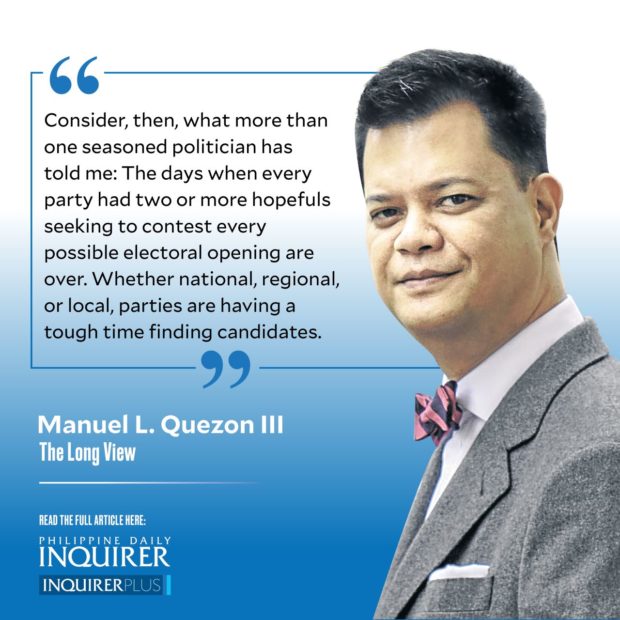‘Areglado na ang kilay!’
Sixty years ago, Nick Joaquin featured the newest in political slang, saying the term for the done deal, the sure thing, politically speaking, would date you. Back then, in the early 1960s the new thing was “Ayos na ang butó-butó.” Previous decades had “tapos na ang boksing,” not to mention, “Yari na!” from the ’50s, and “Cuarta na!” from the ’40s. But the granddaddy of political “street argot” as Quijano de Manila called it, was “Areglado na ang kilay!” the heckling boast of the Commonwealth years. Which brings us to today’s topic, which is, the real news about our elections in recent years, already happened way before election day: because the candidates, in our inimitable Taglish, already “made areglo.”
Even before the pandemic led to the great migration back to the provinces, the past decades have seen a great internal migration. The Philippine Statistics Authority (as of its 2018 National Migration Survey) reported 55 percent of Filipinos over the age of 15 have moved for three months or more since birth (48 percent internal migrants, 2.5 percent abroad, 4 percent both internally and abroad). The political effect of this? Established political networks are increasingly deprived of the web of patron-client ties that takes years and many elections to establish. Anecdotally, politicians complain that the electorate has become very mercenary, which makes election only possible through wholesale vote-buying: to the extent that even milking public office can’t recoup the costs. Then again, there are academic studies that reckon only two-thirds of those who accept money or goods for their votes, actually vote as promised. So risk remains high even as campaigns escalate in costs.
Consider, then, what more than one seasoned politician has told me: The days when every party had two or more hopefuls seeking to contest every possible electoral opening are over. Whether national, regional, or local, parties are having a tough time finding candidates. And even if a slate can be scraped together, it’s become increasingly a losing proposition to even contest the elections because it’s that much harder to eke out a victory. The solution is incredibly like the approach of business in our country, to the challenges of competition in the open market: the creation of cartels. Competing factions sit down, divide the positions between them, ensuring a quota for each with unopposed candidacies for all. Risks and costs are reduced, everyone stays in the game.
I started paying attention to this after the late President Noynoy Aquino told me after the 2013 midterms that, across the board, political families faced the toughest contests they’d faced since 1986. It must have put the fear of the electorate in the hearts of many clans. In 2016, those who ran unopposed were as follows: 39 out 235 members of the House (16 percent); 14 out of 81 governors, 14 out of 81 vice governors (17 percent respectively), 220 mayors and 255 vice mayors of the 1,634 vacant positions for each (13 percent and 15 percent respectively).
In 2019, the midterms, 36 members of the House, eight governors, 12 vice governors, 44 provincial board members, 19 city mayors, 198 municipal mayors, 33 city vice mayors and 241 municipal vice mayors, 32 city councilors and 248 municipal councilors all ran unopposed.
The Inquirer reports that this year, 39 congressional candidates are running unopposed or 15 percent of the 253 available district seats, nine governors in 81 provinces or 11 percent are unopposed (for vice governor, it’s 11 out of 81 or 13 percent unopposed), while out of the 782 provincial board seats up for grabs, 45 board members (5 percent) are sure bets because they’re unopposed. In 1,634 cities and municipalities, 203 mayors (12 percent) and 254 vice mayors (15 percent) are unopposed; as for city or municipal councilors, 284 (or 7 percent) of those seeking to fill the 13,558 seats are unopposed.
Rappler noted that the number of unopposed congressmen, governors, vice governors, mayors, and vice mayors has remained fairly steady; but it said that there’s been a “huge increase” in the number of unchallenged (thus “sure-win”) provincial board members and city and municipal councilors: with “a number of entire slates without challengers.” By any measure, these are remarkable national numbers, a minimum of one out of every 10 officials up for re-election are doing so unopposed. But it’s worth underscoring that this is a reaction to the political players being increasingly unelectable. Or, conversely, the price of competition getting too steep for the politicians’ comfort. But if this is so, can the provincial barons still deliver votes? Perhaps what matters less is whether they can or do, and more the perception of electoral inevitability their endorsements enhance.





















